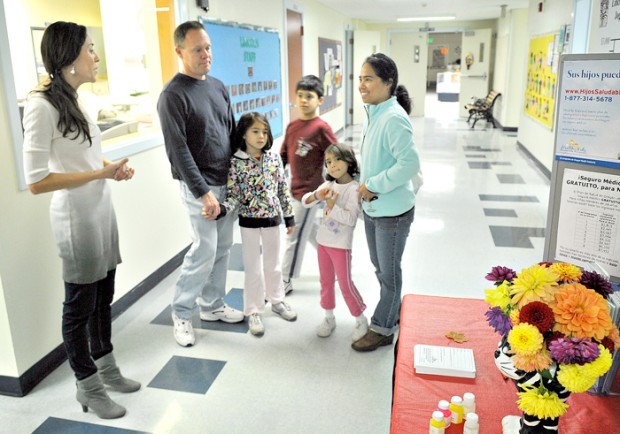
OSU alumna Kelly Volkmann is program manager for the Benton County Health Department’s Health Navigation Services team that is meeting with parents at Lincoln School in Corvallis to let them know about the benefits available to them through 100% Lincoln. “It’s exciting to be in this partnership, creating connections for families, giving them hope…and health,” she says. Kelly has OSU undergraduate degrees in public health, Spanish, and international studies, and a Master’s in public health in international health. “One of our health navigators, Monica Juarez, is a 2009 graduate of OSU’s human development and family sciences program. She is an Oregon Health Plan and Healthy Kids Application Assister, and has been as essential part of the efforts to increase the number of children who have insurance coverage in Benton and Linn Counties.
Reprinted with permission from the Corvallis Gazette Times, October 29, 2010
By Raju Woodward, Photos by Andy Cripe
Thursday marked the first day of a program that aims to help Lincoln School students and their families get health insurance through Healthy Kids, an expansion of the Oregon Health Plan.
The outreach program, “100% Lincoln,” is a collaboration between the school, the Lincoln Parent-Teacher Association, the Benton County Health Department and Community Services Consortium.
“It’s definitely a great and exciting feeling to be able to give students and families hope,” Lincoln Principal Oscar Moreno-Gilson said Thursday. “We are always working to meet their needs, even outside of the classroom.”
Healthy Kids provides medical, dental, vision, preventive care, prescriptions and mental health services at no cost or low cost to children whose household income isn’t more than 300 percent of the federal poverty level.
For example, families of four with a household income of less than $44,000 are eligible for no-cost health insurance, while families of four with a household income from $44,000 to $66,000 are eligible for low-cost insurance.
Families of four with a household income of more than $66,000 can get health insurance through Healthy Kids, but they must pay full cost.
Employees from the Benton County Health Department talked Thursday to families who were in between parent-teacher conferences about whether they need insurance. The also shared information about “100% Lincoln” and Healthy Kids. They eventually will set up appointments with families interested in enrolling in Healthy Kids and help them with the application process.
“We’ve had about 20 families who don’t have insurance talk to us,” said Lizdaly Caniel, a health navigator for the Benton County Health Department. “Some of them didn’t know about the options that are out there.”
Moreno-Gilson said the school hopes to reach out to every family at Lincoln by the end of December. The school has an enrollment of 321 students this year. Caniel and Fabiola Sandoval, another health navigator for the Benton County Health Department, will be at Lincoln again on Monday, and more visits are planned.

“We are going to be at every school event we can through December,” Sandoval said. “After that, we will make home visits if necessary. It’s very important that we get as many people insured that we can. Even people who have health insurance still may need dental or vision insurance.”
Moreno-Gilson said that families aren’t required to sign up for health insurance coverage, even if they qualify for free or low-cost insurance. He said some families may be hesitant to enroll in Healthy Kids because it sounds too good to be true, or they don’t think they need it. That latter group might include those who need it most.
“Oftentimes, when you live in poverty, you develop a certain mentality,” Moreno-Gilson said. “I was one of those kids who grew up with no insurance. You just hope you don’t get sick. If you do, hope it gets better and/or you just get used to it.”
Sandoval said when members of the Lincoln PTA first started talking about starting “100% Lincoln” two years ago, many parents didn’t realize how much it was needed.
“I think people would be surprised how many children don’t have insurance,” Sandoval said. “It’s not just children who are in poverty or low-income. There’s a new-middle class poor because a lot of employers aren’t providing the same kind of health insurance that they used to.”
The impact of our Health Navigators is immeasurable, say’s Kelly Volkmann who relayed this story of Fabiola Sandoval’s experience. “A mom with undocumented children called me because a member of her church had told her about our Safety Net program. The four children ranged in ages from 11-17, and would only come for their required school vaccinations and when really, really sick. The $20.00 minimum fee was enough of a barrier that the children would only see a provider as a last resort. None of the children had had a well child exam, or a dental cleaning in eleven years. Dental care was limited to extractions and fillings, and were provided through the occasional mobile dental vans/tooth taxis at the children’s school.After explaining the program to her, the mom was left speechless as she realized that her children would be able to get a comprehensive physical as well as dental care. She thanked me repeatedly and said ‘Que Dios la bendiga’ (‘May God bless you’), her voice cracking as we ended the call. Since then, all four children have received a well child exam, flu shot and dental screening/cleaning at our Community Health Center. These children now have an established primary care home.”